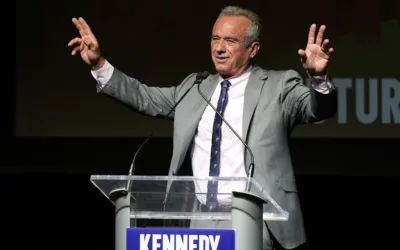
Wisconsin's child care system is in crisis as funding from critical programs is set to run out (photo via iStock).
Here is what the childcare system looks like today, why it is receiving criticism, and what the future might be for childcare in Wisconsin.
On August 8, Gov. Tony Evers called the state legislature into a special session to address Wisconsin’s chronic workforce challenges. Part of this effort includes a push to stabilize the state’s childcare system.
Childcare is a prominent issue on Evers’ agenda, and with good reason, as the state’s system is in dire straits and in need of solutions. On September 30, states like Wisconsin will see sharp decreases in childcare support from the federal government as emergency pandemic-era funding from the 2021 American Rescue Plan comes to an end. Without action from Congress or the state legislature, Wisconsin is set to lose nearly 5,000 childcare jobs and over 87,000 children will lose childcare services.
What is the state of Wisconsin’s childcare system?
Childcare advocates across the state have warned about the childcare crisis for years.
Pre-pandemic, 86% of child caregivers said childcare issues hurt their time commitments or effort at work, according to data from Raising Wisconsin, a coalition led by the Wisconsin Early Childhood Association dedicated to connecting families with young children to quality childcare. Wisconsin’s economy loses an estimated $1.1 billion annually from infant-toddler childcare challenges.
Families of 117,090 children do not have access to childcare in Wisconsin, according to data from the Bipartisan Policy Center. There is a 40.6% childcare gap – the gap between the number of children who potentially need childcare and the number who cannot reasonably access care within driving distance of their home – in Wisconsin. . In some counties, this gap is even worse. For example, Richland County has a 82.9% childcare gap – one of the worst in the state.
What is being done?
Right now, the legislature is in a stalemate over childcare funding.
“With the largest surplus in state history, my biennial budget included meaningful, comprehensive, long-term investments and solutions to address Wisconsin’s longstanding workforce challenges, reduce barriers to employment, and prevent these challenges from becoming an unmitigated crisis that would have calamitous consequences for Wisconsin’s already-strapped workforce,” Evers said. “Unfortunately, Republicans failed to meet the moment, sending my budget back to my desk absent critical investments in key areas.”
As part of his call for the special legislative session this September, Evers will seek to rework how much the state budget will allocate to a comprehensive workforce plan, including funding for Wisconsin’s childcare system.
Evers is proposing to invest over $1 billion of the state’s $4 billion surplus into his workforce plan, $365 million of which would go directly into propping up the childcare industry.
Two of the state’s biggest childcare programs would receive funds from this proposal: Child Care Counts and the Partner Up! program.
Funding for Child Care Counts is currently set to expire in January 2024 after 3 years of supporting families during the pandemic. To date, the program has provided aid to 4,000 Wisconsin businesses and kept over 22,000 childcare providers employed. Over 60% of providers say they will need to raise tuition once the program expires to continue offering childcare services.
“For years, the child care sector has been operating on razor-thin margins,” according to Child Care Counts. “Simply put, the childcare market has long been broken.”
“The end of the program will have lasting ripple effects for the child care field, families, businesses and the overall economy,” said Ruth Schmidt, Executive Director of the Wisconsin Early Childhood Association.
Evers would give the program more than $340 million to make it a permanent addition to the state’s childcare system. Such an investment was initially rejected by the legislature this past spring when Evers proposed his initial biennial budget.
Partner Up! is a state grant program that provides funds for businesses that offer childcare to employees through one of Wisconsin’s regulated childcare providers. Business and childcare providers alike benefit from the grant. Evers’ new plan would add $22 million to the program.
If Wisconsin Republicans don’t approve Evers’ requests–or some other form of support for childcare centers–the honus may fall on Congress, where the Republican-controlled House also appears uninterested in resolving the crisis.
As the federal funds provided by the American Rescue Plan are set to run out in September, no new funding initiatives have been passed to replace it. But some Senators are urging Congress to take action. Wisconsin Senator Tammy Baldwin is one of 40 Senators who in April reintroduced the Child Care for Working Families Act – a bill that would stabilize the childcare sector with additional funds.
With just weeks to go until federal funds expire–and months until state funding lapses–the clock is ticking and Wisconsin families are anxiously awaiting to see whether they’ll get the support they need.
For more information on current childcare resources in Wisconsin, click here.

This billionaire’s PAC is spreading a big lie about Tammy Baldwin, Medicare, and taxpayer savings
Restoration PAC, funded by Uline’s Richard Uihlein, twists the significance of forcing Big Pharma to negotiate for lower bulk pricing on Medicare...

New Biden rules deliver automatic cash refunds for canceled flights, ban surprise fees
In the aftermath of a canceled or delayed flight, there’s nothing less appealing than spending hours on the phone waiting to speak with an airline...

Opinion: It’s time for Congress to fight for small businesses instead of big corporations
May is National Small Business Month. Our elected leaders need to show leadership all year long. For the past 27 years I’ve been fortunate to pursue...

Biden makes 4 million more workers eligible for overtime pay
The Biden administration announced a new rule Tuesday to expand overtime pay for around 4 million lower-paid salaried employees nationwide. The...




